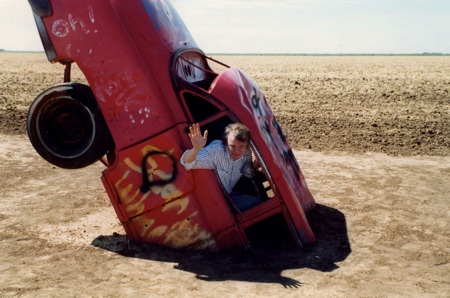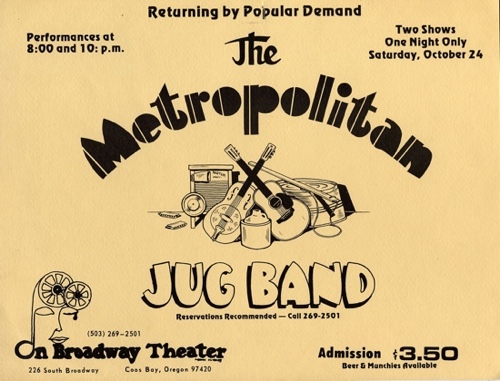Lake Erie, Bay Village, Ohio; Spring 2000

Photo by Chris Collins
From the London desk of Steve Beeho...
Academic male slags alert!
Although they might see it differently, Mark E. Smith’s and Billy Childish’s resolute commitment to the punk ethos that raw music and art aren’t incompatible left their contemporaries from the class of 77 (UK division) in the dust a long time ago. And it’s striking how both men’s work is rooted in a deliberate form of localism, (each still lives close to where they grew up) while their wilful anti-professionalism is combined with an industriousness that puts their peers to shame (Childish’s productivity verges on the industrial!).
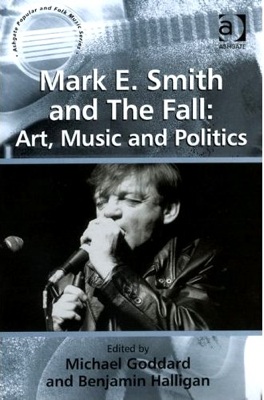 With such rich and ever-expanding bodies of work it was inevitable that the academic world would catch up. What’s far more surprising is that the results aren't too shoddy at all.
With such rich and ever-expanding bodies of work it was inevitable that the academic world would catch up. What’s far more surprising is that the results aren't too shoddy at all.In 2008 the one-day ‘Messing Up the Paintwork’ conference devoted to Mark E. Smith/The Fall took place at the University of Salford. The majority of the papers have now been published in the collection 'Mark E. Smith and The Fall: Art Music and Politics'
As a taster the introductory chapter is online [pdf file], as is Mark Fisher's dazzling piece on the early 'classic' era, 'Memorex for the Krakens: The Fall's Pulp Modernism', originally published in three parts here, here, and here.
Not every essay hits the mark – sometimes the un-Fall-like earnestness gets a bit much and an attempt to draw parallels with the Situationists is particularly strained - but overall the collection makes a refreshing antidote to the cliched one-dimensional coverage that The Fall are so often lumbered with nowadays.
Neal Brown’s rather more compact 'Billy Childish: A Short Study', (which used to be online as a much snazzier pdf), rightly treats Childish’s music, poetry and painting as inextricably linked expressions of the same distinctive aesthetic vision, rather than compartmentalising them. Brown says in his afterword that what began as an essay blossomed into an “inadequately short book” and looks forward to the day a more comprehensive book on Childish’s work appears. It can’t be long.
Meanwhile Stuart Schrader deconstructs in four parts the contemporary flyer attacking the 1978 San Francisco punk benefit for striking Kentucky miners, and unravels the clash between punk’s pragmatic er, “autogestion” [self-management] and the self-righteous more-radical-than-thou one-upmanship of the far left. And who knew that Nico Ordway, the lyricist of the Dils’ 'Class War' thunderbolt, is now better known as neocon pundit Stephen Schwartz?!
Writing in Standpoint, Nick Cohen looks at how the British Revolutionary Communist Party has reinvented itself as rent-a-quote controversialists for media consumption.

Drawing by James Fotopoulos
From the Desk of Joe Carducci…
Steven Greenhouse in the NYT, "Labor’s New Critics: Old Allies in Elected Office".
“At a time when many private sector workers have been badly squeezed by stagnant wages, soaring health care premiums and shrinking 401(k)’s, resentment has grown even among private sector union members toward the public employee unions. ‘It’s almost as if the private sector is blaming the public sector as the spoiled child in the house of labor,’ Professor Chaison said.”
***
 David Grant in the CSM on Megan Stack’s book, Every Man in this Village Is a Liar.
David Grant in the CSM on Megan Stack’s book, Every Man in this Village Is a Liar.“Perhaps the book’s most elegant passage is one where Stack – without condescension or simplification – brings the reader eye to eye with the Arab world’s profound sense of shame and dispossession. As Stack discusses the torture and rampant, vicious (and often deadly) backbiting of the Saddam Hussein regime with an Iraqi from the Shiite holy city of Najaf, the man’s hands tremble and his silence deepens before he allows, ‘Really, it is a shame upon us that we have such things.’ Stack writes: ‘A shame upon us. I shivered in the heat. Yes, that was it, somebody had finally said it out loud. These people were embarrassed about what they had endured, about the parts they had been forced to play – victims or tormentors, it was all unendurably shameful.’ And so, Stack observes: ‘They had sunk deeper and deeper into collective guilt until the moment of their final humiliation: they had been invaded by the Americans.’”
***
Francesco Sisci at atimes.com on Yu Shicun’s book Zhongguo Nan.
“Yu shuns the main winning characters, the heroes of the history books. He prefers the ones who stood on the side, who were defeated, and who represent the deep undercurrents of Chinese society but who were beaten and mauled by the main stream of history. So, Yu ignores Empress Ci Xi, who embodied the stubborn resistance to modernization and change, and chooses to tell us about Guang Xu, the emperor who tried to reform the empire but was toppled, imprisoned, and at last poisoned by Ci Xi. Yu equally ignores the epic founder of the Chinese Communist Party, the stern Li Dazhao, and gives us instead the portrait of his tortured alter-ego Qu Qiubai, the tragic communist intellectual who ended up facing a Nationalist firing squad while his comrades were roaming the country in what later was called the Long March.”
***
Guy Dinmore in the FT on Chinese crime families in Italy.
“With Italy’s own Mafia entrenched in Sicily and the south, investigators say it is natural that Chinese criminal gangs move in to exploit niche markets in the central and northern cities hosting rapidly growing Chinese populations. ‘We need voices from within the community to tackle these criminal gangs. We need a protection plan for collaborators,’ Mr Grasso says.
Piero Tony, Prato state prosecutor, estimates there are some 45,000 Chinese in the city, of whom only 10,000 are there legally. In a recent speech Mr Tony said Chinese criminal gangs were the strongest in the area, vying for power with the Russian, Albanian, Nigerian and Romanian criminal groups. ‘The Chinese have enclaves of closed communities where there is not a strong Italian Mafia,’ says Mr Grasso, noting that in Sicily Chinese businesses were forced to pay the pizzo – extortion money – to the Cosa Nostra rather than Chinese organised crime.”
***
Pacific Islands Report editorial, "Pacific’s New Arab Friendship Comes at a Price".
“Samoa’s undecided on whales. We’re really not sure. They come around here from time to time and we don’t want them wiped out or anything but possibly killing them sustainably is acceptable. However, on the issue of Iran’s occupation of some obscure islands claimed by the United Arab Emirates, Samoa’s policy is crystal clear. We want Iran out.
Your newspaper is indebted to the The National newspaper in Abu Dhabi, the UAE capital, for this important and possibly surprising information since no explanation or announcement has been forthcoming from closer to home - for example government buildings.”
***
Edward Glaeser in the New Republic on Joel Mokyr’s book, The Enlightened Economy.
“The Industrial Revolution is the inflection point of economic history. During all the millennia before that revolution, incomes were static and humans were poor -- often hungry, inadequately clothed, ill-housed. But somehow, in the two-and-a-half centuries since humanity learned to mass produce, a large number of ordinary people have acquired more material comfort than even the wealthiest magnates of the pre-industrial era. A modern Wal-Mart would have been a place of incalculable riches to Charlemagne.”
***
Andrew Willis at euobserver.com, Allegations of secret Colombian plan to undermine EU.
Nothing infuriates the arbiters of world justice than that their defendants be caught defending themselves.
***
 No doubt straight-arrow Jan Wenner thinks he’s helping out the President by slipping the off-the-record conventions from his reporter so as to, what? Stop the war? Bring the war home? Impress Bono? I suspect the military will continue to advertise in Rolling Stone because they don’t understand rapidly changing media demographics, but there probably won’t be another sit-down that yields anything but the kind of briefing palaver the old New Journalists of the Johnson era called the Follies. The mag’s website doesn’t post anything as weighty as a story so when the story broke from early promotional distribution before the mag was out, even in NY and LA, both Time and Politico posted pdf’s of the story. This was duly noted as “new-media theft” only by old-media types, which thereby shoots to shit their own case to stay viable by charging for copyrighted product as of some future date agreed upon secretly in collusion with competitors in clear restraint-of-trade violation of whatever’s left of the Constitution. It is interesting that magazines can still make news, but the web forced Rolling Stone to post this story. Or rather, Time and Politico forced them by threatening to steal profit in terms of site-traffic. When RS relented and posted it the others took down their pirated copies and linked to the RS site. Still, it’s ongoing because the news media is obsessive mostly about itself. Here’s Tuesday’s update at Yahoo.com , and Matt Taibbi who gets to posture as the standard of righteous cool because he keeps it clean at Rolling Stone magazine. Say Matt, what’s Lady Gaga really like? [In case RS must soon change the headline under pressure from cool sisters, it was originally titled, Lara Logan You Suck.]
No doubt straight-arrow Jan Wenner thinks he’s helping out the President by slipping the off-the-record conventions from his reporter so as to, what? Stop the war? Bring the war home? Impress Bono? I suspect the military will continue to advertise in Rolling Stone because they don’t understand rapidly changing media demographics, but there probably won’t be another sit-down that yields anything but the kind of briefing palaver the old New Journalists of the Johnson era called the Follies. The mag’s website doesn’t post anything as weighty as a story so when the story broke from early promotional distribution before the mag was out, even in NY and LA, both Time and Politico posted pdf’s of the story. This was duly noted as “new-media theft” only by old-media types, which thereby shoots to shit their own case to stay viable by charging for copyrighted product as of some future date agreed upon secretly in collusion with competitors in clear restraint-of-trade violation of whatever’s left of the Constitution. It is interesting that magazines can still make news, but the web forced Rolling Stone to post this story. Or rather, Time and Politico forced them by threatening to steal profit in terms of site-traffic. When RS relented and posted it the others took down their pirated copies and linked to the RS site. Still, it’s ongoing because the news media is obsessive mostly about itself. Here’s Tuesday’s update at Yahoo.com , and Matt Taibbi who gets to posture as the standard of righteous cool because he keeps it clean at Rolling Stone magazine. Say Matt, what’s Lady Gaga really like? [In case RS must soon change the headline under pressure from cool sisters, it was originally titled, Lara Logan You Suck.]He didn’t approve of David Brooks’ column in the NYT, "The Culture of Exposure", either but some higher-up got nervous apparently over a David Brooks You Suck header. But Brooks hardly had to use a single synapse to conclude his analysis of the RS’s mess, “Government officials will erect even higher walls between themselves and the outside world. The honest and freewheeling will continue to flee public life, and the cautious and calculating will remain.”
Daniel Heninger in the WSJ takes a wider veiw as well in his "Perils of the Media Presidency":
“Only two presidents have held office in an always-on information milieu this vast -- George W. Bush and Barack Obama. Both, in different ways, have not recognized the scale of the new reality and suffered for it, as Mr. Obama is now. George Bush didn't care. He got hammered, ending his presidency with an approval rating driven so low by bad media… that it sucked his party down the drain.
Barack Obama cared. He used the Web to win the White House. Once in the White House, Obama allowed -- no, he encouraged -- the electronic vapors to raise him up to the status of an iconic presidency. His White House whiz kids deployed all the elements of electronica to ensure that Barack remained larger than life.
No person, no president, can bear this much media weight. Presidents need to find a way to redistribute the load. They need to find a way to re-normalize expectations.”
***
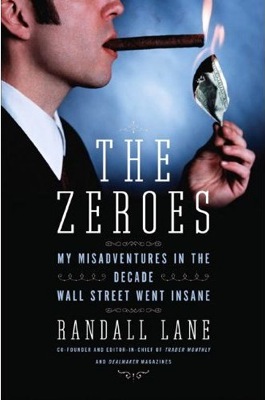 This explains why I used to get Trader Monthly in the mail despite 1) never subscribing to it, and 2) not being a trader of anything. Edward Kosner in the WSJ on Randall Lane’s book, The Zeroes.
This explains why I used to get Trader Monthly in the mail despite 1) never subscribing to it, and 2) not being a trader of anything. Edward Kosner in the WSJ on Randall Lane’s book, The Zeroes.“Soon the pair comes under the spell of a business-mag vet named Jim Dunning, who pumps his own millions into the enterprise and spins a vision of tiny Doubledown quadrupling down in a bid to become an international marketing machine stalking the new ‘working wealthy.’ The hunt for money to grow on puts Lane & Co. on a treadmill to oblivion. Mr. Lane meets with a grotesque assortment of bankers, venture capitalists, merger partners, potential acquirers and other scalawags. Black books and deal sheets are exchanged. Credit lines are dangled and jerked away. At one point his venture is valued at $25 million; at another, $17 million.
Such healthy valuations were strange because as ‘The Zeroes’ goes along it becomes obvious that, while Mr. Lane's company is churning out a half-million free copies a month, it is really in the business of staging parties. Advertisers and potential advertisers pay Doubledown for the privilege of pouring the latest designer vodka down the gullets of Wall Street's new aristocracy, peddling $10,000 watches on the wrists of arm-candy models and enticing rich marks into $300,000 Maybach luxury sedans and time-share condos in Las Vegas.”
***
Campbell Robertson and John Collins Rudolf in the NYT playing "Who’s the Tarbaby?" for their editorial board’s nervous bet for the 2012 matchup: Jindal vs. Obama.
***
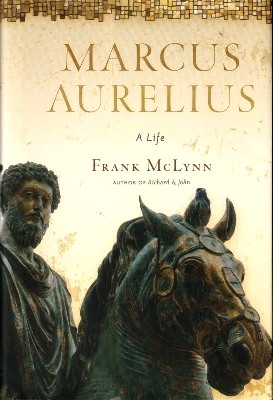 Emily Colette Wilkinson at Incharacter.org on Frank McLynn’s book, Marcus Aurelius - A Life.
Emily Colette Wilkinson at Incharacter.org on Frank McLynn’s book, Marcus Aurelius - A Life.“Between the hyper-intellectual abstractions of university philosophers and the calculating, materialistic schemes of self-help gurus, lies another philosophy. This is the philosophy of the ancients, of Marcus Aurelius….
Marcus Aurelius' contribution to this philosophy has come to be known simply as the Meditations, though the title Marcus gave the work -- more a private collection of self-examinations and moral exercises than a systematic philosophy or spiritual autobiography intended for publication -- was ‘The matters addressed to himself.’ And it is as much a model of moral self-examination as a demonstration of Stoic principles. The work's subtitles suggest that Marcus wrote some portion of the text during Rome's Marcommanic wars, a long, brutal series of military campaigns prompted by the invasions of barbarian German tribes on the northern boarders of the Roman Empire during the 160's.
These wars occupied most of the last two decades of Marcus' reign as emperor (160's and 170's), but to read the Meditations, you would not imagine them to be the writings of a man encamped in barbarian lands in the midst of war, nor of a man commanding the largest army ever assembled on the frontier of the Roman empire, nor of a man whose empire and army were in the grip of the Antonine plague (believed now to have been smallpox or measles, possibly both), that lasted from 165-180 and killed, by some estimates as many as 18 million people, including, in 180, Marcus himself (notwithstanding Ridley Scott's fanciful version of Marcus Aurelius' death in Gladiator-smothered by his son, the psychotic future emperor Commodus). The Meditations' lack of political or worldly anguish and anxiety is a mark of the philosophy they profess: Stoicism.”
***
Noah Feldman in the NYT on "The Triumphant Decline of the WASP".
“Why did the Protestant elite open its institutions to all comers? The answer can be traced in large part to the anti-aristocratic ideals of the Constitution, which banned titles of nobility and thus encouraged success based on merit. For many years, the Protestant elite was itself open to rising white Protestants not from old-family backgrounds.
Money certainly granted entrée into governing circles, but education was probably more important to the way the Protestant elite defined itself, which is why the opening of the great American universities has had such an epochal effect in changing the demographics of American elites. Another key source was the ideal of fair play, imported from the ideology of the English public schools, but practiced far more widely in the United States than in the class-ridden mother country.
Together, these social beliefs in equality undercut the impulse toward exclusive privilege that every successful group indulges on occasion…. This was not just a case of an elite looking outside itself for rejuvenation: the inclusiveness of the last 50 years has been the product of sincerely held ideals put into action.
Interestingly, this era of inclusion was accompanied by a corresponding diffusion of the distinctive fashion (or rather anti-fashion) of the Protestant elite class. The style now generically called ‘prep,’ originally known as ‘Ivy League,’ was long purveyed by Jewish and immigrant haberdashers (the ‘J.’ in the New Haven store J. Press stands for Jacobi) and then taken global by Ralph Lauren, né Lifshitz. But until the Protestant-dominated Ivy League began to open up, the wearers of the style were restricted to that elite subculture. The spread of Ivy League style is therefore not a frivolous matter.”
***
Ahmed Zewail in the CSM on American science as soft power-strong force.
“I felt the full force of this soft power when I came to the US in 1969 to begin graduate studies at the University of Pennsylvania. I discovered how science is truly a universal language, one that forges new connections among individuals and opens the mind to ideas that go far beyond the classroom. My education in America instilled in me greater appreciation for the value of scholarly discourse and the use of the scientific method in dealing with complex issues. It sowed, then nurtured, new seeds of political and cultural tolerance.
But perhaps most significant was that I came to appreciate the extent to which science embodies the core values of what the American Founders called ‘the rights of man’ as set forth in the US Constitution: freedom of thought and speech, which are essential to creative advancement in the sciences; and the commitment to equality of opportunity, because scientific achievement is blind to ethnicity, race, or cultural background.”
***

Here’s an Artbook w/CD worth buying, if it’s out or when it’s out, and it’s yet more evidence of the richness of the Los Angeles music scene in the punk era:
End of the World! World Imitation & Monitor 1977 - 1982 by Antonio Beecroft.
“Somehow, over the years I had developed an image of Monitor as a kind of hippie fascist survival cult, living solely on bee pollen and LSD in a rural Southern California canyon, re-entering civilization only to hastily buy the rare candy bar at convenience stores. I was only partially wrong.”
***
Jay Babcock re-posted his Black Flag How-they-done-it at arthurmag.com.
And here’s Jay’s re-post of my old email feature, The History of Black Flag Line-up by Line-up.
***
 Neil Genzlinger in the NYT on “Leave It to Beaver”.
Neil Genzlinger in the NYT on “Leave It to Beaver”.“‘Jokes get in the way,’ Tony Dow, who played Wally, said in a telephone interview, talking about the ‘Beaver’ writers’ reliance on more placid, observational humor. ‘They get in the way of your concentration when you’re trying to get at a story. We would throw jokes out at the table reading.’
That is what hits you first when you sit down with a box of ‘Beaver’: television comedy was a much slower animal back then. You have to detox mentally to watch these shows, to lay aside your caffeine and BlackBerry addictions and be prepared to wait for your rewards. That bathtub scene takes almost three and a half minutes to unspool. In that time Hannah Montana could have traded six insults with her father, tripped over a couch, lost her wig, dumped two boyfriends and had a crisis involving shoes.”
***
Anthony Lane in the NYer on the Eurovision song contest [no link] is funny enough but since they sent him there it’s too long considering that it is without musicological insight, though on the language of the lyrics he explains much. He notes that only Abba and Celine Dion of the winners or losers ever graduated from the contest to any sort of international (read: American) career. Lane is a Brit so he uses Brit rock signposts to illustrate even the distance between actual Brit-pop and the unaccountably only slightly more risible Brit entries. Lane is right to say the songs are not out of line with the rest of Europe’s actual pop. He notes P.J. O’Rourke’s beholding a 1986 Warsaw dance floor and bemoaning ‘the tragic lack of black people behind the Iron Curtain.’ But as Lane remarks there’s been American jazz ex-pats in Paris for going on a hundred years and there’s enough Africans playing music in their parks that they don’t even have to turn the radio on to get exposure to rhythm.
But Europe is not America. And again, all those five centuries of racism in America? That was peoples getting to know one another in the inadequate but true human way they do in a free republic (or before that, in a distant, tenuously governed colonial wilderness). Humans today in Europes east and west are not free in the same American-style way, and smiling at the ex-natives in the park drum away is no substitution for the world-historical meeting and centuries-long steeping of British (and French and Spanish) folk songs and church music with the African culture of playing music. One of Rough Trade Records’ p.r. slogans one found on their postcards in the early 1980s, was “Free Up Your Foundation.” That was lifted from some Jamaican, knowing them, but though they understood that was what Britain needed, they were barely capable of allowing such. The British come closest over there I suppose, but as I listen to some of Lightbourne’s foundational records from his highschool and college years in the late fifties to the mid-sixties (New Lost City Ramblers, Koerner Ray & Glover, Holy Modal Rounders, Michael Hurley, John Fahey…) I’m struck again by the high quality of people involved making American music and the resultant high folk/high pop/rock and roll that they produced. And imagining what these American geniuses were up against to be heard come 1963, one might concur with Dave’s seemingly rash summary point made to Elliott Johnston and his tape recorder: “Fuck the Beatles.”
***
Obituaries of the Week
•Dwight Armstrong by Margalit Fox in the NYT.
•Algirdas Brazauskas in the Telegraph.
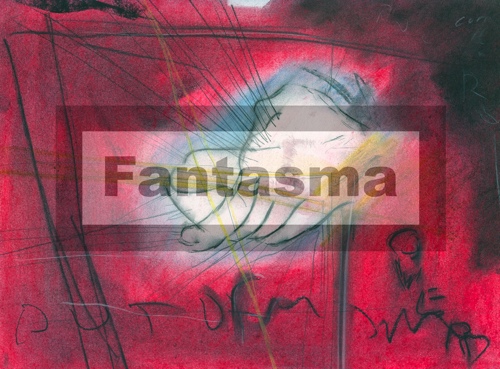
To receive a weekly update notice for the NV, send an email to newvulgate[at]sbcglobal.net with SUBSCRIBE in the subject line. To stop receiving notices, do the same with the word UNSUBSCRIBE.
• The New Vulgate
• Joe Carducci, Chris Collins, James Fotopoulos, Mike Vann Gray, David Lightbourne
• Copyright retained by the writer, artist, or photographer



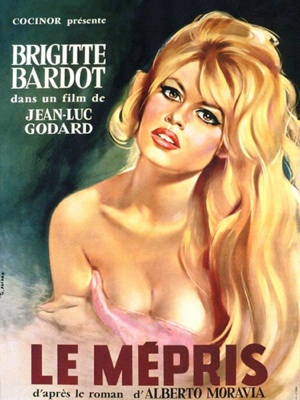 •escroc (n.m;, as in masculine noun, as in un escroc, pronounced ESS-CROW): Rip-off artist.
•escroc (n.m;, as in masculine noun, as in un escroc, pronounced ESS-CROW): Rip-off artist.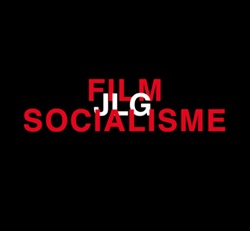 Film socialisme, Godard’s latest foray into nothingness, is one of those flicks that you can say you’ve seen once you’ve seen the trailer. Kind of like The A-Team. You know sometimes when you’re at an expo or a
Film socialisme, Godard’s latest foray into nothingness, is one of those flicks that you can say you’ve seen once you’ve seen the trailer. Kind of like The A-Team. You know sometimes when you’re at an expo or a 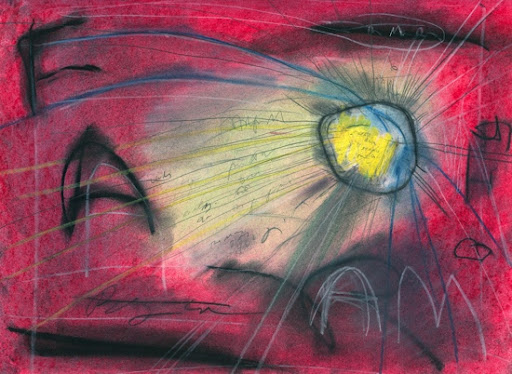
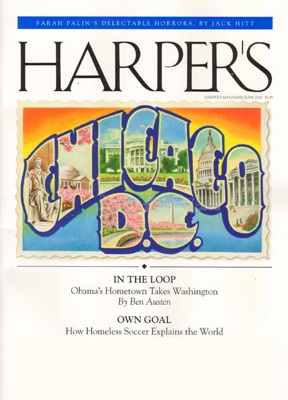 Ben Austen in
Ben Austen in 
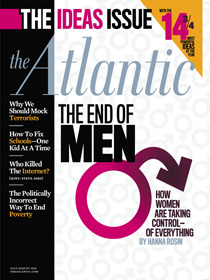 Hanna Rosin in
Hanna Rosin in  Lee Harris at
Lee Harris at  The May 17 issue of
The May 17 issue of 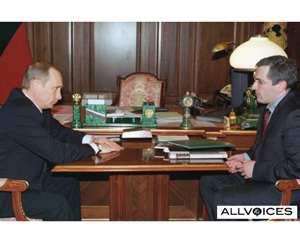 Maryana Torocheshnikova at
Maryana Torocheshnikova at  One can see the
One can see the 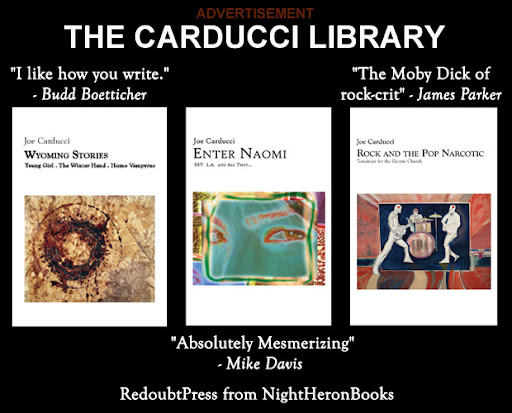


 Even when Chicago was by convention referred to as the Second City it was the largest coherent city that was not cobbled together like New York from its five constituent boroughs for pride of first-place against the Chicago growing from nothing in the second half of the 19th Century, or Los Angeles which annexed south for a port and north for tax base. Each “city” rumbles with secession efforts from time to time, but Chicago abides, though not without changes and despite being topographically as inadequate as it is geographically ideal -- the city was basically raised up out of the swamp onto a concrete substructure to allow for non-disease-ridden living and the construction of skyscrapers. It lost a million citizens from its early seventies three-plus million peak. As I’ve noted before, Houston has been the true Second City to Chicago in recent years if one is talking about cultural places that hang together as cities.
Even when Chicago was by convention referred to as the Second City it was the largest coherent city that was not cobbled together like New York from its five constituent boroughs for pride of first-place against the Chicago growing from nothing in the second half of the 19th Century, or Los Angeles which annexed south for a port and north for tax base. Each “city” rumbles with secession efforts from time to time, but Chicago abides, though not without changes and despite being topographically as inadequate as it is geographically ideal -- the city was basically raised up out of the swamp onto a concrete substructure to allow for non-disease-ridden living and the construction of skyscrapers. It lost a million citizens from its early seventies three-plus million peak. As I’ve noted before, Houston has been the true Second City to Chicago in recent years if one is talking about cultural places that hang together as cities. Hockey is to Chicago sports as Chicago is to its coastal betters. That is, under-appreciated, often forgotten and then it finds itself back in its old default status as bracketed with wrestling and roller derby. But people forget as well that basketball and football, especially in their professional leagues, were also cheap, gym-rat diversions. My dad told me that conventional sentiment among sports fans in the forties and fifties was that no-one would ever really take professional sports seriously, other than baseball. As late as the seventies professional basketball was a rather tawdry affair, especially the majority of the games between non-contending teams. Television and its money and the players’ unions fight for more of it, and the owners’ fight to find more money forged a desperate glamour from decades of tawdry locker room crud collected doing duty for b-ball, hockey, wrestling, boxing….
Hockey is to Chicago sports as Chicago is to its coastal betters. That is, under-appreciated, often forgotten and then it finds itself back in its old default status as bracketed with wrestling and roller derby. But people forget as well that basketball and football, especially in their professional leagues, were also cheap, gym-rat diversions. My dad told me that conventional sentiment among sports fans in the forties and fifties was that no-one would ever really take professional sports seriously, other than baseball. As late as the seventies professional basketball was a rather tawdry affair, especially the majority of the games between non-contending teams. Television and its money and the players’ unions fight for more of it, and the owners’ fight to find more money forged a desperate glamour from decades of tawdry locker room crud collected doing duty for b-ball, hockey, wrestling, boxing….
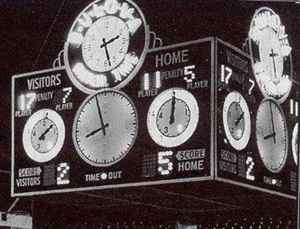 My dad took my brothers and I to a game some time in this period, probably sometime before 1965. We sat back in a corner of the mezzanine well under the first balcony. We didn’t go often as my dad followed Pittsburgh teams rather than Chicago teams, but we got into the Stadium as kids to see the Blackhawks and the Bulls who were launched in 1966 as an expansion team. For basketball you could walk right down and take one of the good seats, there were so few people attending games in the years before the Dick Motta teams of the early seventies.
My dad took my brothers and I to a game some time in this period, probably sometime before 1965. We sat back in a corner of the mezzanine well under the first balcony. We didn’t go often as my dad followed Pittsburgh teams rather than Chicago teams, but we got into the Stadium as kids to see the Blackhawks and the Bulls who were launched in 1966 as an expansion team. For basketball you could walk right down and take one of the good seats, there were so few people attending games in the years before the Dick Motta teams of the early seventies. Chicago was pronounced “America’s Greatest City” in a 1985 issue of
Chicago was pronounced “America’s Greatest City” in a 1985 issue of 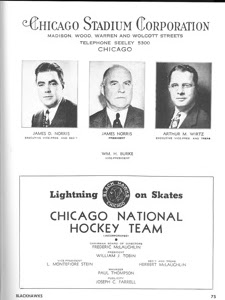
 Ben Bentley, once the PA announcer at the Stadium and former boxing promoter and all around thirties-type gym rat, said once in the decades-long dog days of Chicago sports, “If you could only win in this town.” Bentley knew that all those Chicagoans walking around their bungalows in an east european fog would near jump out of their skin if their identification-investment in the local teams actually paid off in a championship. A big part of the Blackhawks diehards are from the first ring of working class suburbs within Cook County. The last year of the Stadium’s existence, 1994-5, was the year Lightbourne moved back to Chicago. My brothers and I had season tickets but I bought two in the second balcony so Dave could get a last look at the place. Up there it was all young adults from Berwyn, Cicero, Maywood and the like. Couples in groups sneaking a smoke reveling in the glory of their tawdry low-rung sport -- their secret: the Blackhawks at the Chicago Stadium. You can see today’s version of these Bohunk girls running after the busses at the Victory Parade last Friday in the Trib’s Alex Garcia’s
Ben Bentley, once the PA announcer at the Stadium and former boxing promoter and all around thirties-type gym rat, said once in the decades-long dog days of Chicago sports, “If you could only win in this town.” Bentley knew that all those Chicagoans walking around their bungalows in an east european fog would near jump out of their skin if their identification-investment in the local teams actually paid off in a championship. A big part of the Blackhawks diehards are from the first ring of working class suburbs within Cook County. The last year of the Stadium’s existence, 1994-5, was the year Lightbourne moved back to Chicago. My brothers and I had season tickets but I bought two in the second balcony so Dave could get a last look at the place. Up there it was all young adults from Berwyn, Cicero, Maywood and the like. Couples in groups sneaking a smoke reveling in the glory of their tawdry low-rung sport -- their secret: the Blackhawks at the Chicago Stadium. You can see today’s version of these Bohunk girls running after the busses at the Victory Parade last Friday in the Trib’s Alex Garcia’s 
 It seems quite common for teams that reach the finals to be made up of pieces put together by some GM or coach who has recently been fired. Professional sports are a pitiless business but somehow players must be able to lead themselves on as if they fully identify with their new team and new city as if they meant everything to them. They must call up more energy than human nature normally can allow. And then they must play generously and intelligently as a team; something easier to do in college or high school where the bonds and loyalties are more personal. In an NBA final feature on Phil Jackson and what he learned as a Knick they played a clip of Red Holzman saying, “You can’t replace team-play with ability or anything else.”
It seems quite common for teams that reach the finals to be made up of pieces put together by some GM or coach who has recently been fired. Professional sports are a pitiless business but somehow players must be able to lead themselves on as if they fully identify with their new team and new city as if they meant everything to them. They must call up more energy than human nature normally can allow. And then they must play generously and intelligently as a team; something easier to do in college or high school where the bonds and loyalties are more personal. In an NBA final feature on Phil Jackson and what he learned as a Knick they played a clip of Red Holzman saying, “You can’t replace team-play with ability or anything else.” Driving into greater Chicagoland Saturday morning, the day before Game 5, I was listening to
Driving into greater Chicagoland Saturday morning, the day before Game 5, I was listening to 
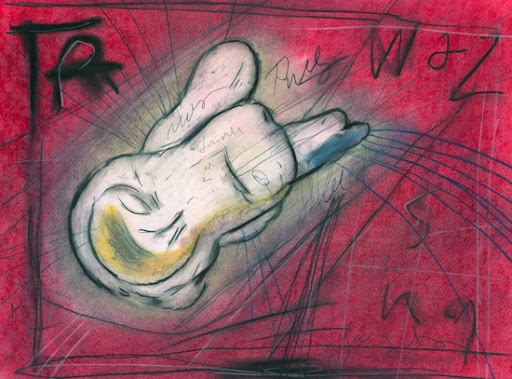
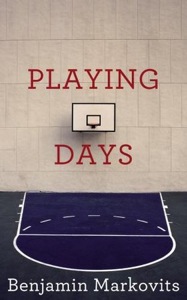
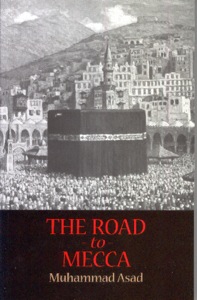 Lewis Gropp at
Lewis Gropp at  This was the week that strange intellectual dead zone, Manhattan feminism, decided to balk at what they have wrought, and see if they might blame Christian patriarchy for it. In the
This was the week that strange intellectual dead zone, Manhattan feminism, decided to balk at what they have wrought, and see if they might blame Christian patriarchy for it. In the 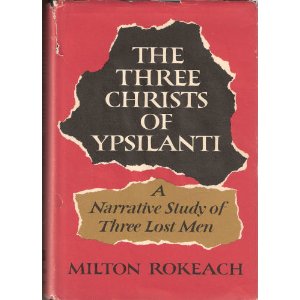 Vaughan Bell at
Vaughan Bell at 